Introduction
We conducted a global survey to understand the workplace sentiments of employees and managers during the period of intense hybrid and remote work due to the global pandemic. This analysis zooms in to focus on support and relationships with HR and managers during the pandemic. We researched the role of HR and its effect on individual contributors, middle management, and senior management. Our survey participants were adults 25 and older employed full-time between January of 2020 and April of 2021.
Major findings
- Remote and hybrid work creates a strain between HR teams and Individual contributors
- HR teams and senior managers worked together very closely and very well during the pandemic
- Middle managers and individual contributors are not feeling as confident in HR’s ability to manage processes in the new world of work
- HR must pinpoint ways to engage not only with senior managers but also middle managers and individual contributors to support greater satisfaction and trust
Background information about the survey respondents
- All respondents are employed full-time for the whole of 2020 through today
- 41% of the respondents are individual contributors, 37% are middle managers, 21% are senior managers

- Parenting – 53% of individual contributors, 60% of middle managers, and 77% of senior managers are parents with children under 18 living with them.

- Working arrangement before the pandemic
77% of individual contributors and 74% of middle managers worked at an office five days a week. However, only 54% of senior managers worked at the office five days a week, which shows that working from home or remotely was a flexibility perk given to senior managers pre-pandemic.

- Travel for work before the pandemic
In 2019, travel for work was very prominent among the U.S. workforce where 38% of individual contributors traveled at least once a month, 41% of middle managers traveled at least once a month, and 70% of senior managers traveled at least once a month.
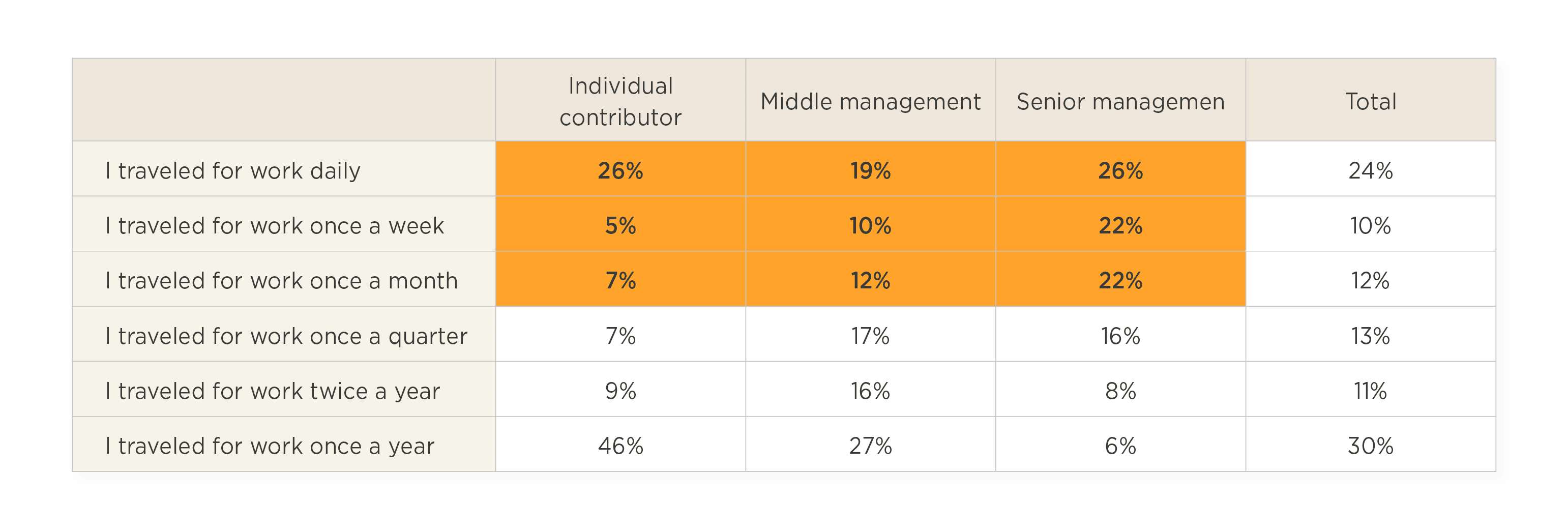
- The purpose of the office before the pandemic
Respondents were asked to rank the purpose they saw in working from the office pre-pandemic between socialization, collaboration, individual work, and company culture from 1-4, where 1 was most useful, and 4 was least useful. Individual contributors ranked socialization as the most important purpose of the office, and managers ranked collaboration as the most important purpose of the office.

HR’s impact and support was not equal across all roles
While HR support resonates with those in senior management positions, many individual contributors feel that their HR teams are generally not investing enough time in them—whether that is because of lack of direct communication, attention, or other reasons. There is a demand for more direct support. HR teams can be using modern HR technology tools to reach all employees and make a meaningful impact.
75% of senior managers found HR to be supportive throughout the pandemic, whereas only 47% and 54% of individual contributors and middle managers felt the same, respectively.

77% of senior managers indicated their HR team was receptive to feedback throughout the last year, and only 55% of individual contributors expressed similar sentiments.
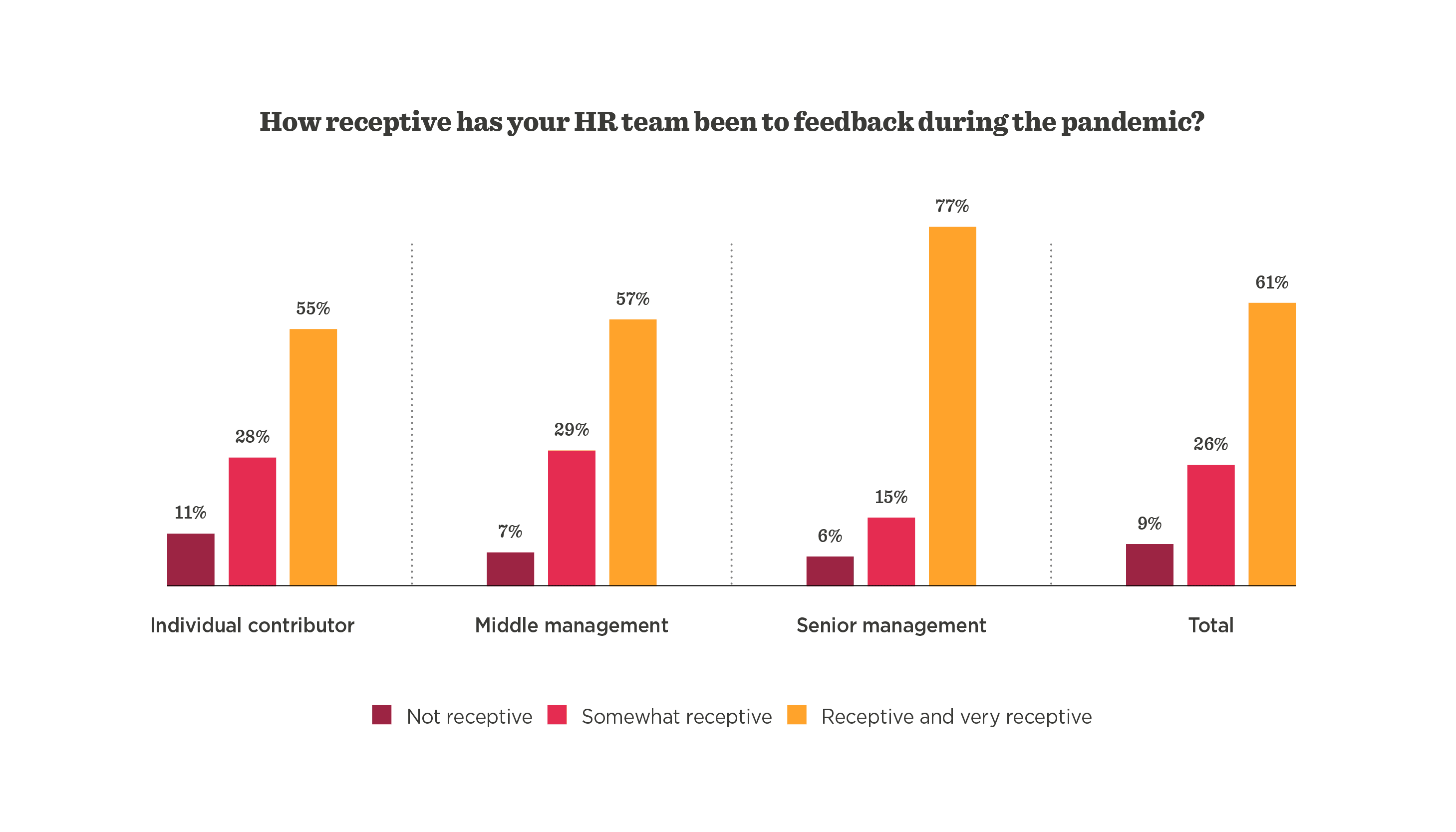
It’s evident that communication between HR and senior team members is open and direct. By implementing the same communication tactics with individual contributors, all employees will feel the impact of HR teams’ efforts in creating a positive workplace experience. HR teams can leverage internal surveys and polls to retrieve feedback, cultivate engagement, and initiate responses to their programs. It seems like fewer individual contributors and middle managers felt HR teams were receptive to their concerns.
Managers are the current change agents
Managers are currently carrying the load of fostering culture in remote and hybrid workplace models, acting as the middleman between individual contributors and HR teams and leadership. Through their more active role in mentoring junior employees and onboarding new employees, managers drive the employee experience by ensuring team processes are upheld while also fostering positive cultures by creating a sense of remote camaraderie.
Two-thirds of respondents (66%) feel their managers have taken on a more active role in developing culture and protecting wellbeing since the start of the pandemic.
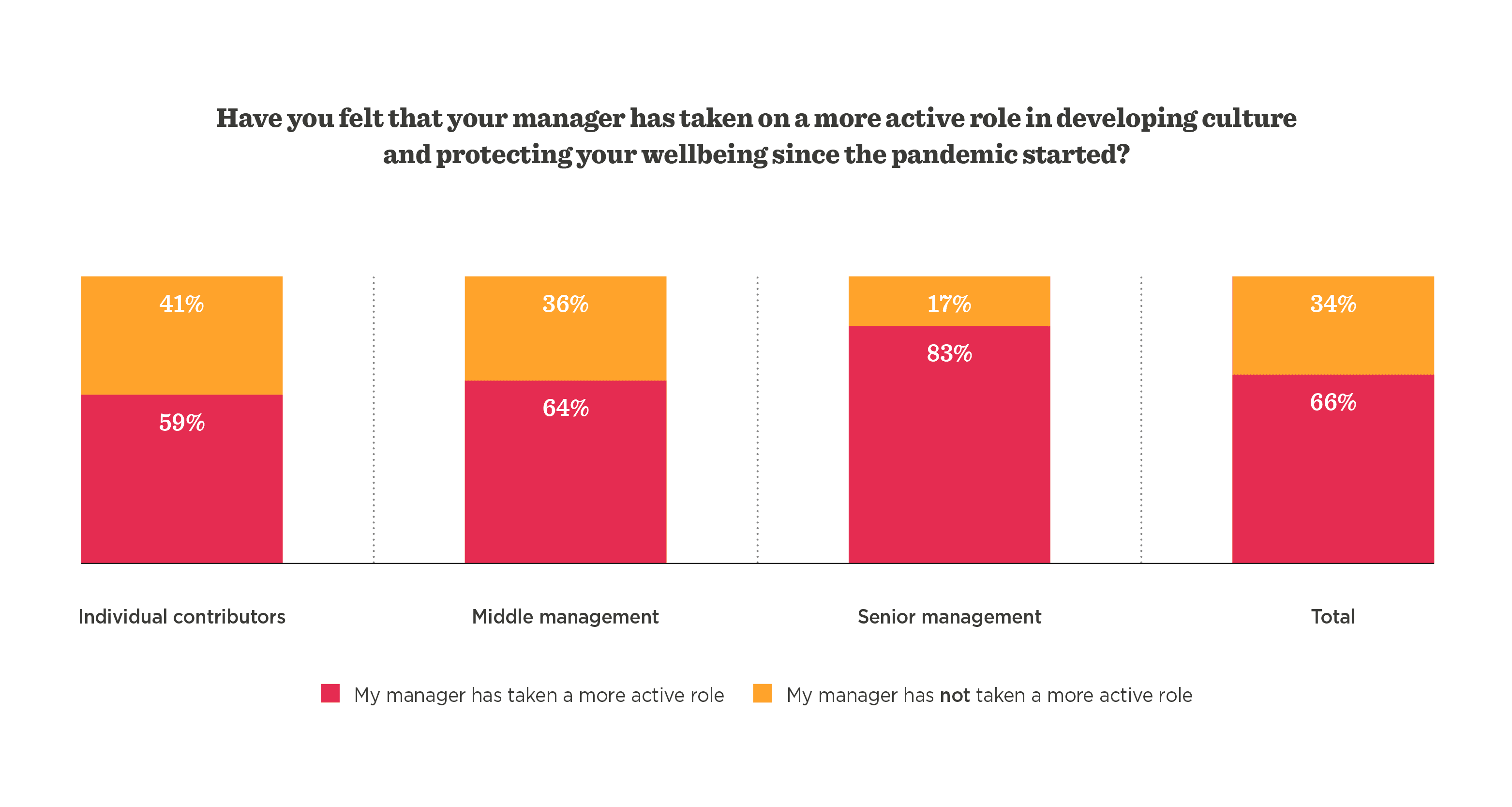
Almost half of the respondents indicated their team lead has been most helpful in transitioning to a remote or hybrid work environment as compared to co-workers and HR teams.
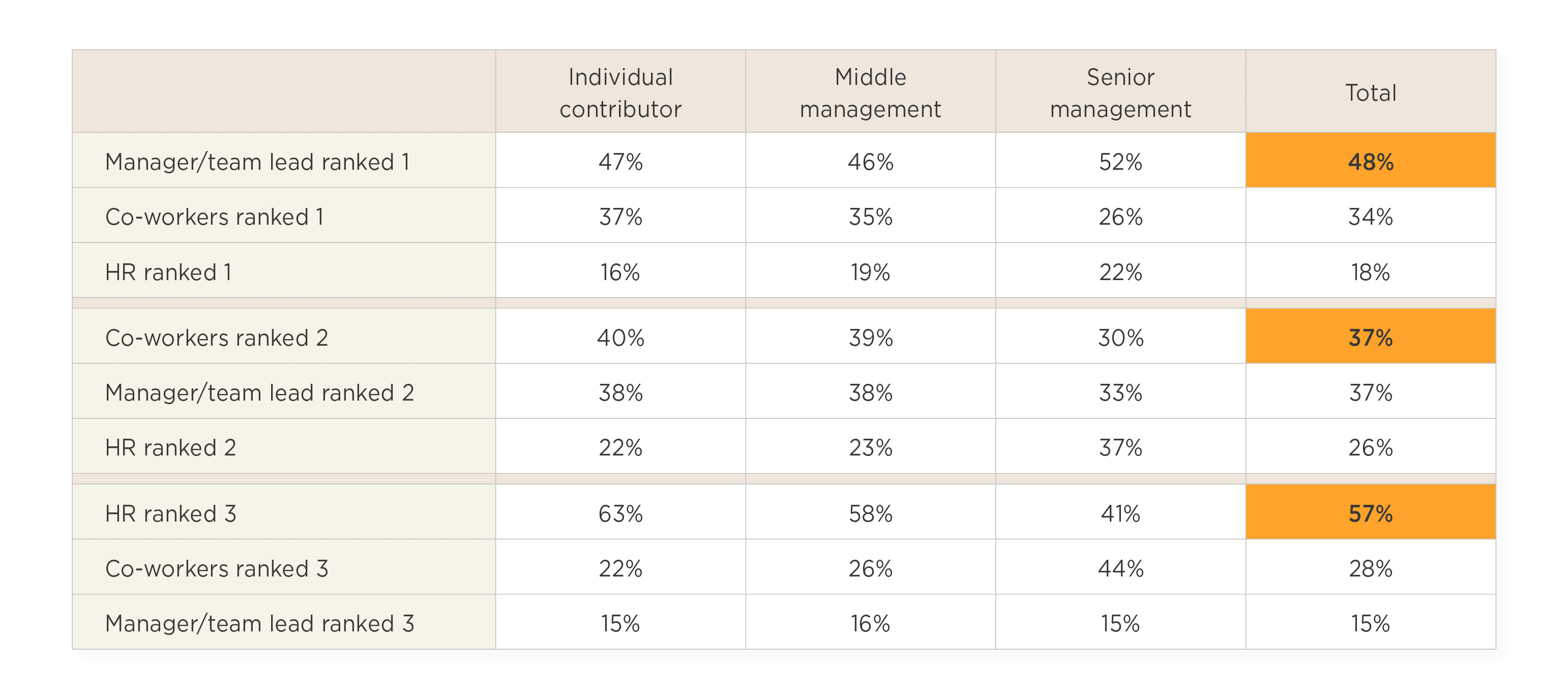
There’s still work to be done in communication between HR and all employees within flexible working environments.
HR teams continue to learn what works and what doesn’t. However, one thing is overwhelmingly evident: managers and HR must join forces to elevate the employee experience, prioritizing active and timely communication, deployment of HR technology, training programs, culture-building, and access to wellbeing support and resources.
Senior managers feel the support of HR teams, and through more open communication and by establishing an active feedback loop, HR teams can also gain the trust of individual contributors.
Confidence in HR to make informed decisions is split
76% of senior managers said they were confident that HR could make an informed decision about a workplace re-entry.
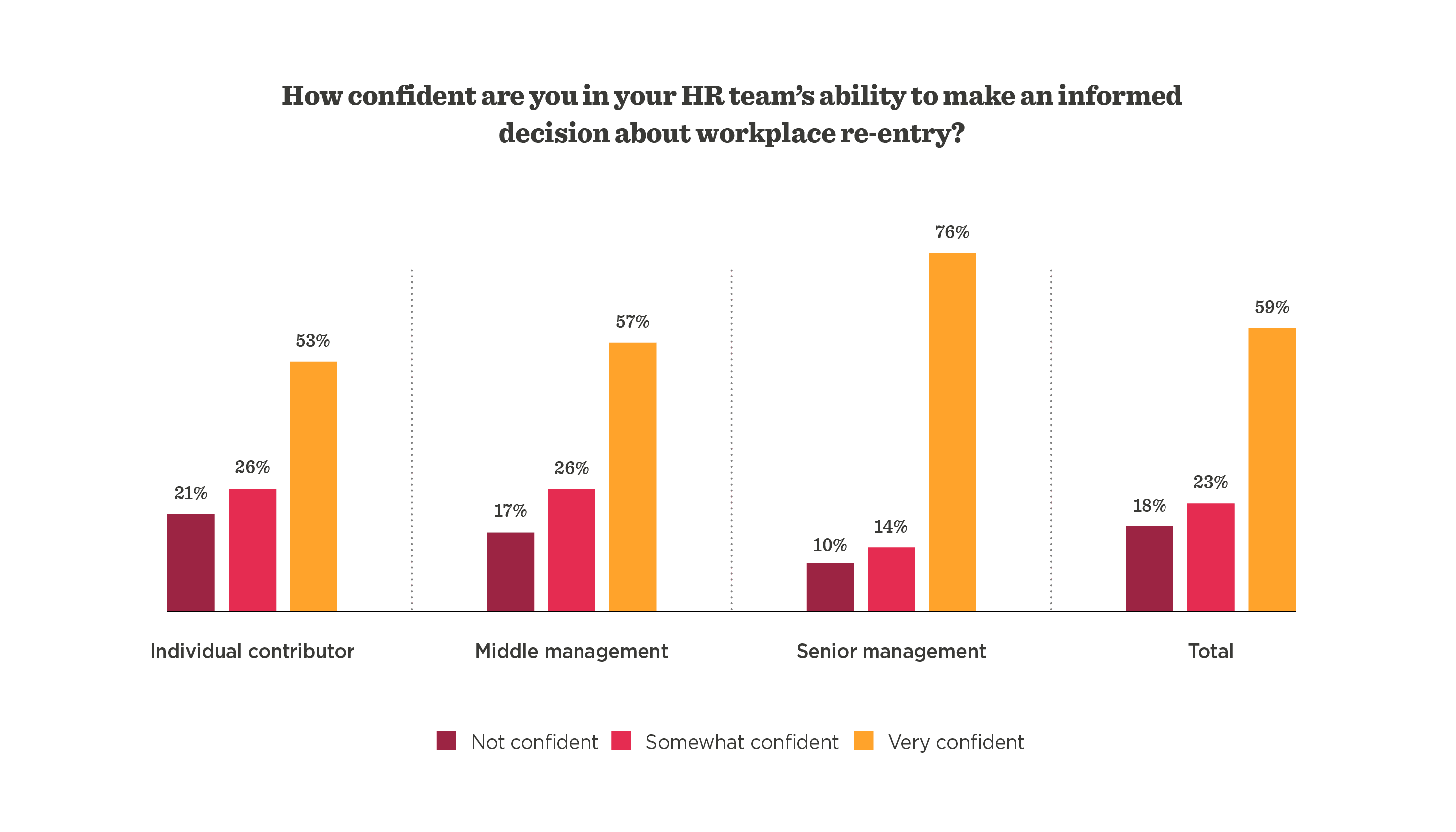
Only half of the individual contributors (53%) felt confident in HR’s ability to make an informed decision about workplace re-entry. This highlights the need for HR to double down on reaching every employee, working with managers along the way to assess employee satisfaction and ensure adoption of company policy across the organization.
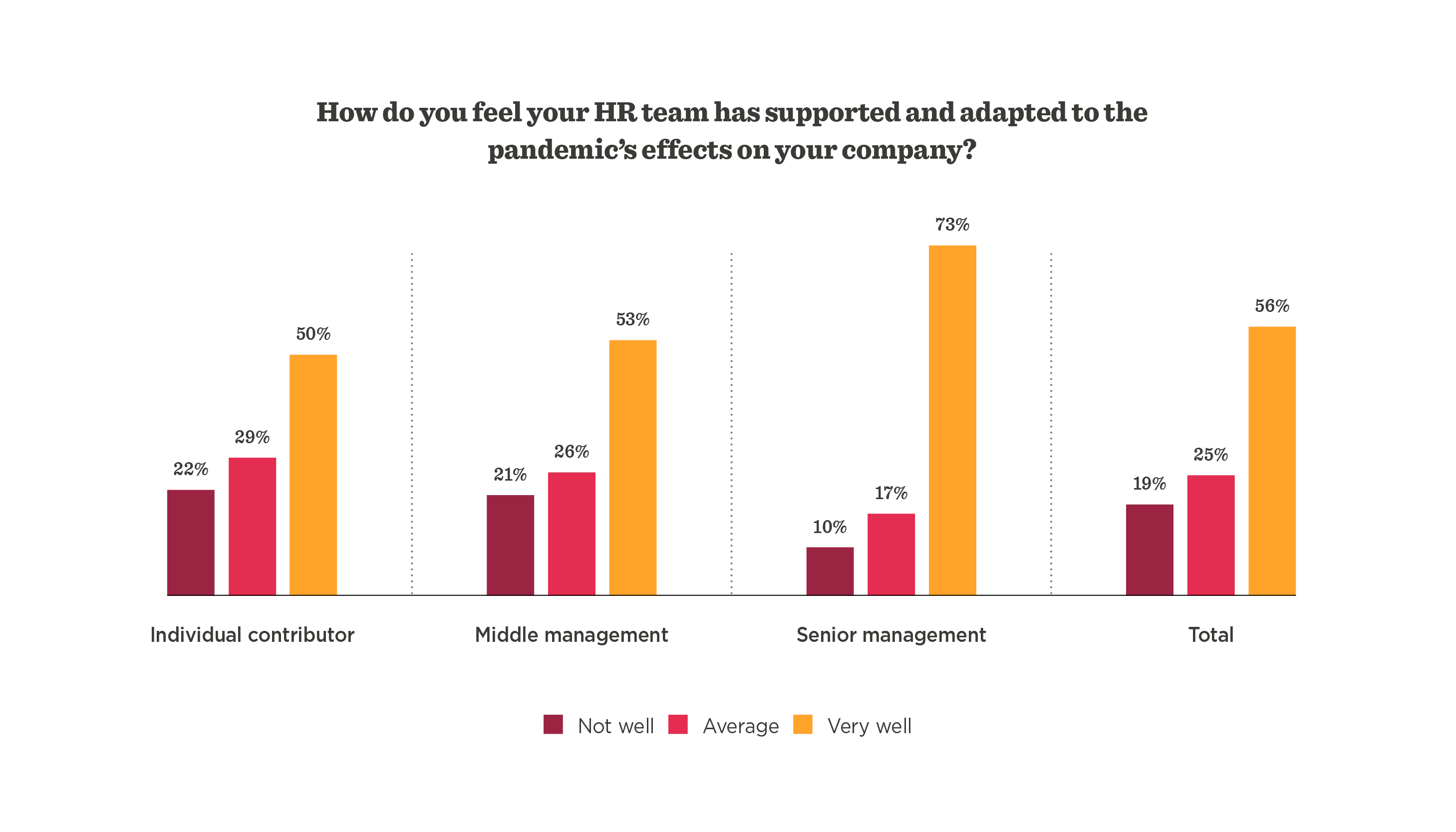
It’s crucial that workers feel informed, supported, and appreciated at every point in their career as businesses evolve in this next phase of the pandemic’s impact on corporate operations and the overall office footprint.
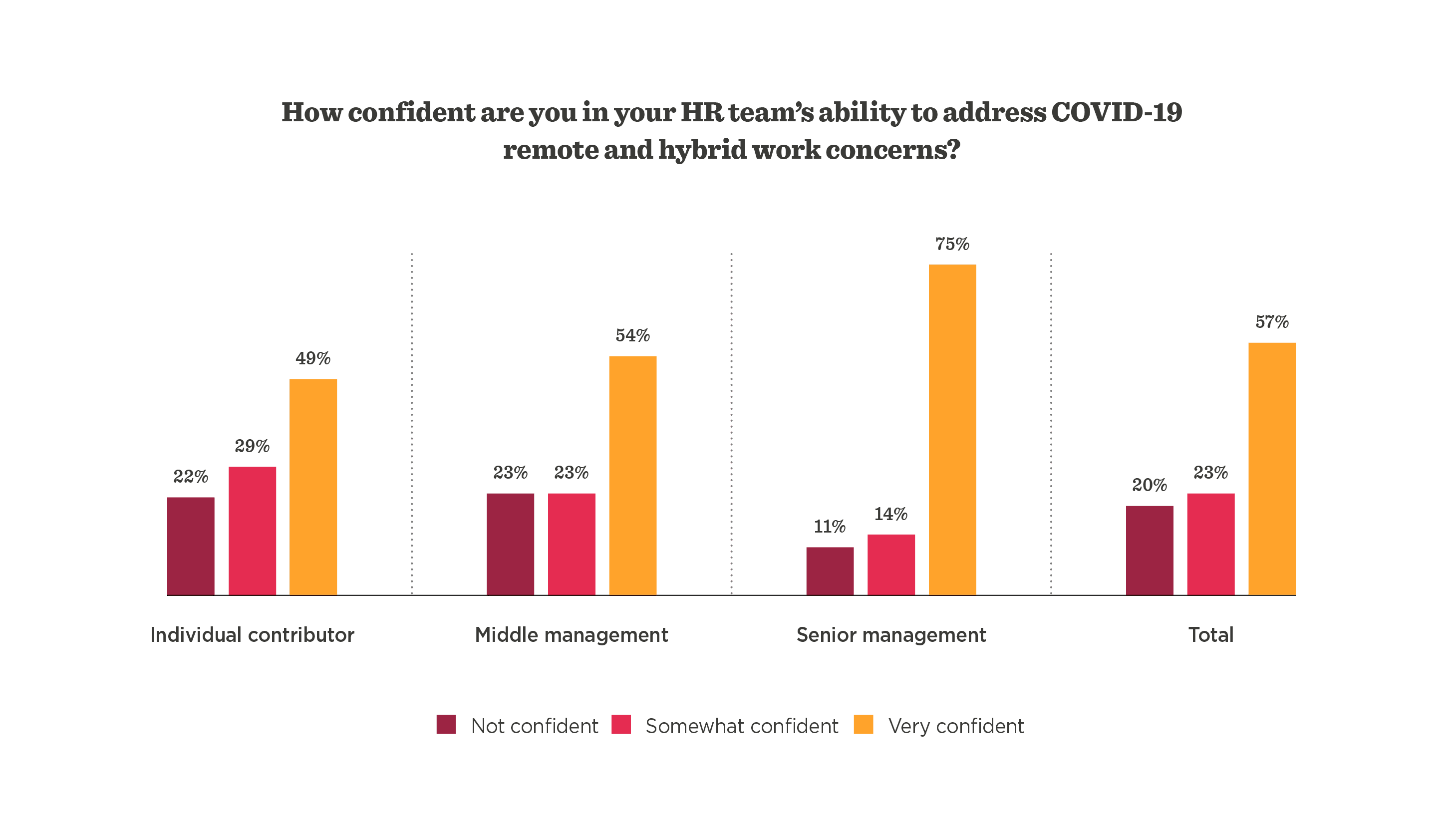
Making this a reality starts and ends with the partnership between HR and managers, which companies should remain hyper-focused on nurturing this year as businesses determine a path forward.
Managers were very instrumental in keeping and building remote company culture
When asked to rank who has been most instrumental in keeping and building company culture, the differences based on role are evident. While 38% of individual contributors ranked co-workers number 1, 43% of senior managers ranked leadership as number 1. 28% of all survey respondents ranked managers as number 1, and almost half (45%) ranked HR teams as number 4. Company culture is maintained and built by team leads and managers with their teams.

Managers are always expected to communicate, and the data shows that managers have kept communicating in the office and remotely. 66% of individual contributors and 68% of middle managers reported that their managers were very communicative before and during the pandemic.

Recommended For Further Reading
HR and managers must transform communications to reach a hybrid workforce
The difference between senior management, individual contributors, and even middle management is the communication and the transparency with HR teams. It is apparent that senior managers trust their HR teams to navigate the company back to the office in a hybrid work arrangement.
Across all roles and genders, employees believe that the benefits of remote and hybrid work outweigh the negative. Both women and men senior managers more than women and men individual contributors see the benefits.
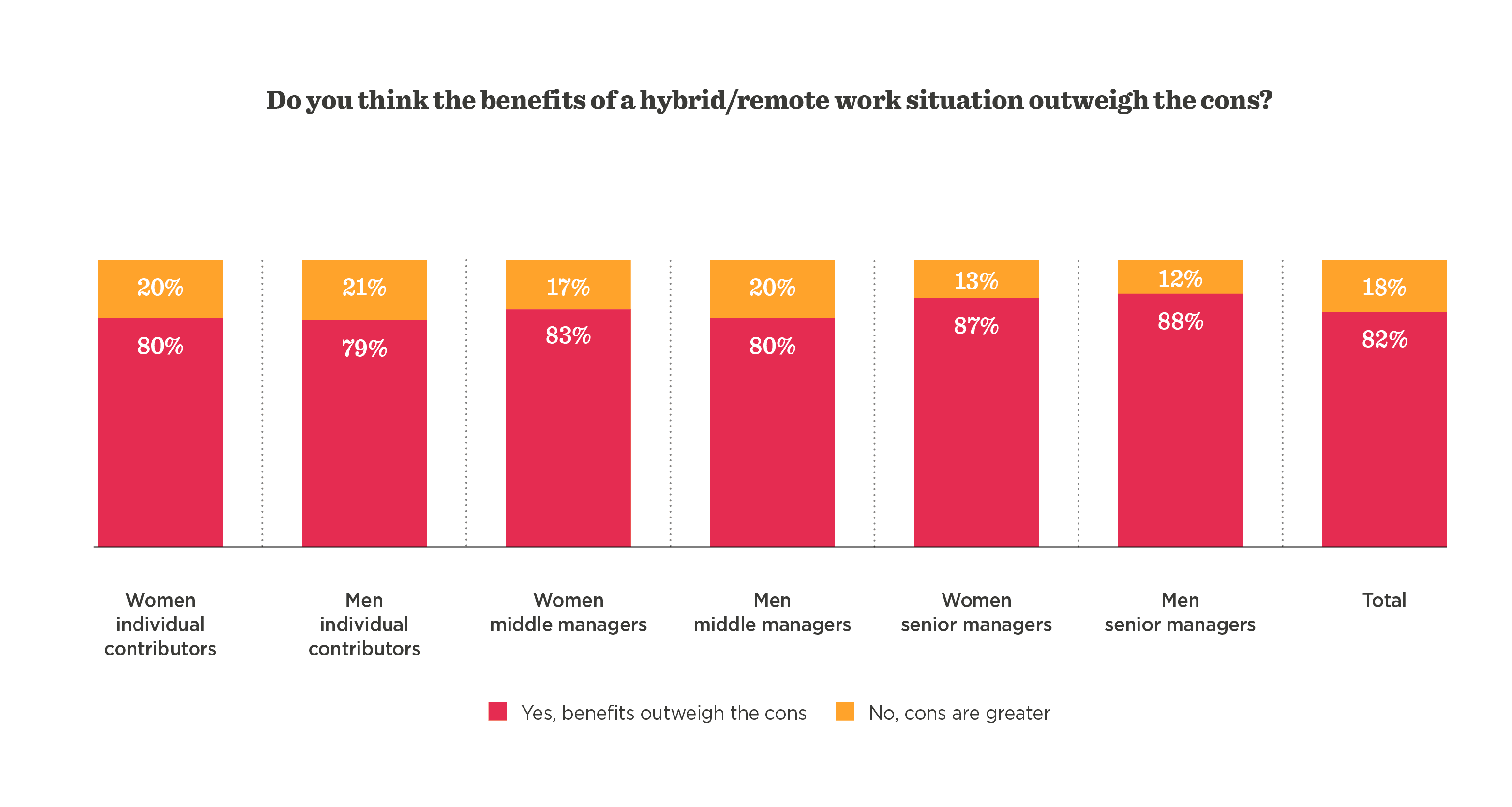
Parents, more than non-parents, believe that the benefits of hybrid work outweigh the cons.
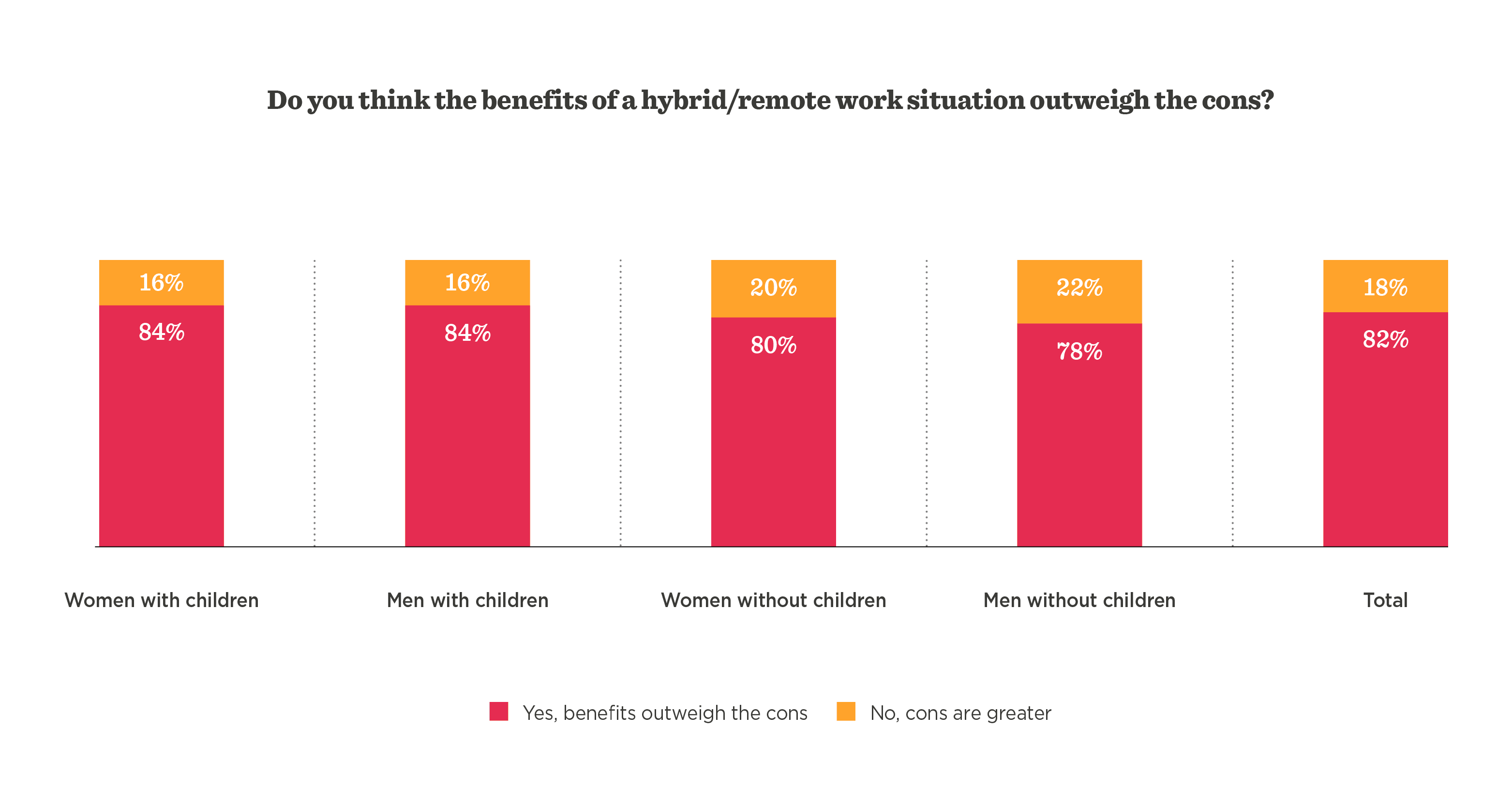
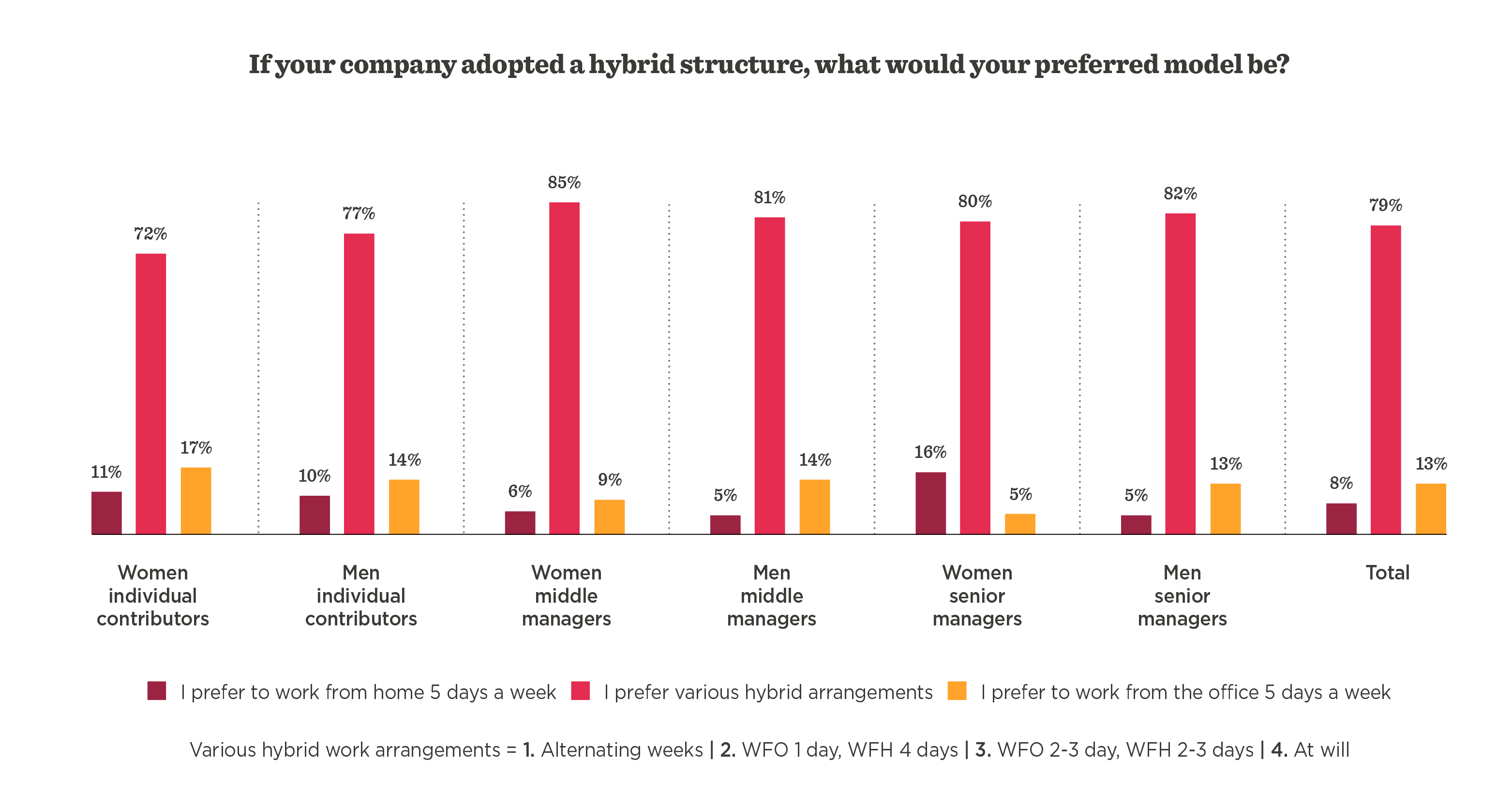
The respondents were asked to choose between various hybrid work solutions:
- Alternating weeks: one week at the office, one week working from home
- Work from the office one day a week, work from home four days a week
- Work from the office 2-3 days a week, work from home 2-3 days a week
- At will: work from home and come to the office “at-will”

76% of senior managers are confident that HR will be able to help everyone transfer to a hybrid work model. This means bringing people to work from the office several days a week and extending work from home for other days. Only about half of individual contributors and middle managers are confident in HR’s ability. The difference is transparency and communication. HR needs to enlarge circles of communication and work with managers to help everyone be in the know about the plans and activities for coming back to the office.

Managers’ ability to work remotely and manage remotely is highly respected, and this is the year they have proven that they can.
It seems that senior managers are more confident in remote onboarding than others, and a lot needs to be done to empower middle managers to be able to onboard remotely.

Conclusions
The future of work calls for seamless HR and manager collaboration. To instill trust within employees across the entire workforce regardless of level, managers and teams must work in tandem to engage in transparent, two way-communication. This is critical to cultivating high levels of engagement, happiness, and ultimately a culture of understanding and belief.
During 2020, worldwide HR teams gained trust and confidence among senior-level managers. However, individual contributors and middle managers feel less supported by HR. Using HR tech tools, HR can better communicate with employees and create confidence in navigating the new world of work.
Middle managers and senior managers have stepped up to the hybrid and remote work challenge. They are trusted by their teams to manage remotely, communicate remotely, onboard new team members remotely, and boost the company culture.
Efficient and effective collaboration between HR and middle management can help HR make a stronger impact, improve the employee experience, and reach every employee. Middle managers should be a key focus point for HR leaders; helping them thrive will help their teams succeed.
The national survey was conducted online by Pollfish on behalf of HiBob on February 25, 2020. It includes responses from 1,000 full-time employees ages 25 and up in the United States.
